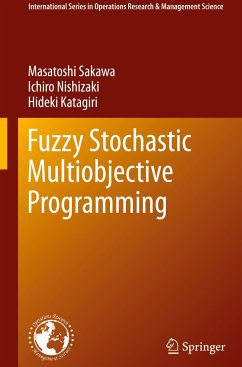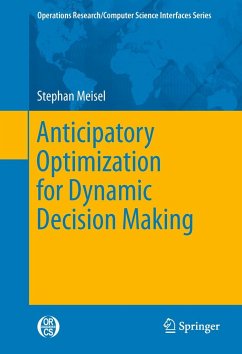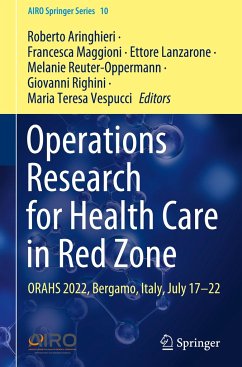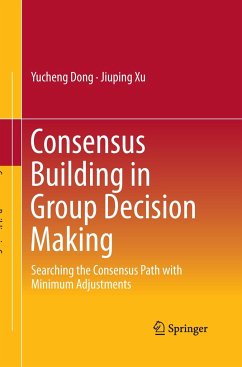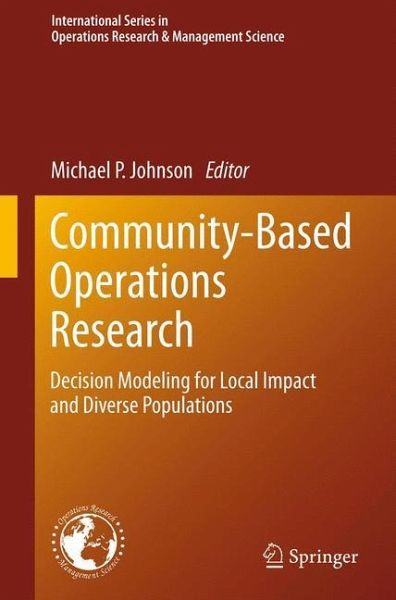
Community-Based Operations Research
Decision Modeling for Local Impact and Diverse Populations
Herausgegeben: Johnson, Michael P.

PAYBACK Punkte
58 °P sammeln!
Community-based operations research (CBOR) is defined as the collection of analytical methods applied to problem domains in which interests of underrepresented, underserved, or vulnerable populations in localized jurisdictions, formal or informal, receive special emphasis, and for which solutions to problems of core concern for daily living must be identified and implemented so as to jointly optimize economic efficiency, social equity, and administrative burdens. This domain was first discussed in a chapter in Tutorials in Operations Research 2007 - OR Tools and Applications: Glimpses of Futur...
Community-based operations research (CBOR) is defined as the collection of analytical methods applied to problem domains in which interests of underrepresented, underserved, or vulnerable populations in localized jurisdictions, formal or informal, receive special emphasis, and for which solutions to problems of core concern for daily living must be identified and implemented so as to jointly optimize economic efficiency, social equity, and administrative burdens. This domain was first discussed in a chapter in Tutorials in Operations Research 2007 - OR Tools and Applications: Glimpses of Future Technologies (INFORMS 2007) by Johnson and Smilowitz and subsequently in an article that appeared in the February 2008 issue of OR/MS Today.
Community-based operations research is not primarily a new methodology, or theory, but a framework for applications of models and methods to address problems with common characteristics, as listed above. The relevant analytical tools for CBOR come primarily from the decision sciences management science, operations research, industrial engineering, and the like: they are intended to help individuals and organizations make better choices regarding strategies to design, services to deliver, facilities to locate, infrastructure to design, and so on. CBOR applications are expected to draw upon methods and tools of academic disciplines that comprise public sector-focused domains: public policy, public administration, public management, urban and regional planning, urban affairs, human services, public health, gerontology, and others.
The research in this book is intended to be normative (defined by stylized models of the real world) and prescriptive (what ought to be done) in nature. However, other research perspectives, defined by descriptive and positive approaches traditionally used in observation-based social sciences, are appropriate as well. For example, an analysis of administrative data and field observations regardinghow certain important problems are actually addressed by practitioners may yield novel insights regarding the likely benefits of alternative problem-solving methods derived from the decision sciences.
This book collects treatments of important social problems that are localized in nature (i.e. characteristics of which vary according to defined areal units such as Census tracts, neighborhoods or municipalities), for which demographic and social characteristics of affected populations are salient (e.g. disparities in usage of services, or outcome measures is associated with individual and community characteristics such as race, ethnicity, gender, social class, economic strata), and for which discussing problems and proposing and implementing solutions is difficult and/or controversial due to conflicting notions of fairness, social impacts and social norms.
Examples of such problems include:
· Defining rules for by which registered sex offenders can find living quarters so as to lead productive lives while protecting populations at risk for criminal victimization;
· Allocations of primary-care physicians across diverse regions of a state to ensure access health coverage for those populations least likely to have health insurance or to use health services while maintaining acceptable levels of service for other populations/regions;
· Design of strategies for provision of affordable and subsidized housing in urban communities that balance the preferences of residents to have access to communities with high levels of amenities with the need of planners to stabilize neighborhoods at high risk of blight.
Community-based operations research is not primarily a new methodology, or theory, but a framework for applications of models and methods to address problems with common characteristics, as listed above. The relevant analytical tools for CBOR come primarily from the decision sciences management science, operations research, industrial engineering, and the like: they are intended to help individuals and organizations make better choices regarding strategies to design, services to deliver, facilities to locate, infrastructure to design, and so on. CBOR applications are expected to draw upon methods and tools of academic disciplines that comprise public sector-focused domains: public policy, public administration, public management, urban and regional planning, urban affairs, human services, public health, gerontology, and others.
The research in this book is intended to be normative (defined by stylized models of the real world) and prescriptive (what ought to be done) in nature. However, other research perspectives, defined by descriptive and positive approaches traditionally used in observation-based social sciences, are appropriate as well. For example, an analysis of administrative data and field observations regardinghow certain important problems are actually addressed by practitioners may yield novel insights regarding the likely benefits of alternative problem-solving methods derived from the decision sciences.
This book collects treatments of important social problems that are localized in nature (i.e. characteristics of which vary according to defined areal units such as Census tracts, neighborhoods or municipalities), for which demographic and social characteristics of affected populations are salient (e.g. disparities in usage of services, or outcome measures is associated with individual and community characteristics such as race, ethnicity, gender, social class, economic strata), and for which discussing problems and proposing and implementing solutions is difficult and/or controversial due to conflicting notions of fairness, social impacts and social norms.
Examples of such problems include:
· Defining rules for by which registered sex offenders can find living quarters so as to lead productive lives while protecting populations at risk for criminal victimization;
· Allocations of primary-care physicians across diverse regions of a state to ensure access health coverage for those populations least likely to have health insurance or to use health services while maintaining acceptable levels of service for other populations/regions;
· Design of strategies for provision of affordable and subsidized housing in urban communities that balance the preferences of residents to have access to communities with high levels of amenities with the need of planners to stabilize neighborhoods at high risk of blight.







